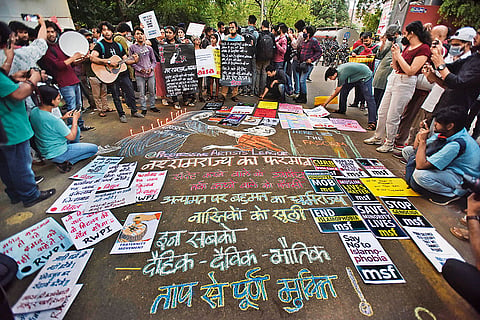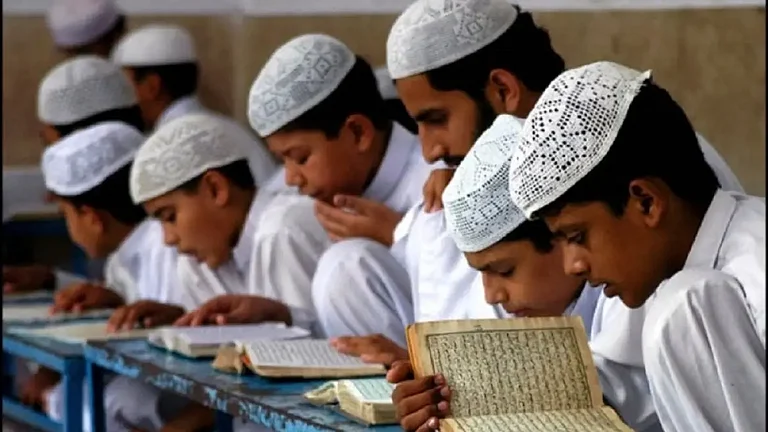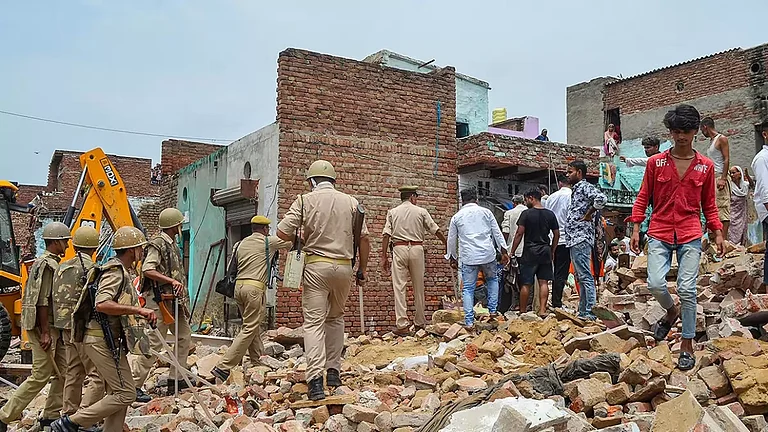In the Indian electoral democracy, the Muslim question, inescapably, is one of the most pressing questions. For the major political parties, and even for some of the regional ones, this question continually upsets their political imagination in redeeming democracy. Their perceptions about Muslim citizenry as an electorate is mired in the convoluted sense of polarisation politics, which reproduces the binary of ‘‘national—anti-national’’, particularly in the backdrop of the ‘‘us-and-them’’ rallying cry. During election campaigns, the acerbic speeches against Muslims, the call for their genocide, annihilation and violence, and the flagrant appeals for stripping of their dignity have become one of the leitmotifs of political mobilisation since the ascension of Hindutva politics in India. Hindutva rhetoric, and the consequent political dividends, flourish on Islamophobia. Certainly, the spectre of what is called the Muslim question haunts the political parties in their strategic electioneering course. So, is there an answer to the Muslim question? Before the answer, it is crucial to deconstruct the Muslim question.
Deconstructing The Muslim Question In India
In the time of polarisation politics and othering, how to respond to the banality of hate?
The Marginalisation of Indian Muslims
There are three issues, among others, that lead to the marginalisation of Indian Muslims, both in terms of electoral and socio-economic aspects. These are: Muslims’ high political underrepresentation, socio-economic exclusion and impoverishment, undergirded by the elements of fear, discrimination, and violence. The Muslim question, essentially, as to what needs to be done to reverse the marginalisation process and to build safeguards against the tyranny of persecution, is at the core of Muslim politics in India.
India is home to one of the world’s largest Muslim populations, about two hundred million, which is significantly decisive electorally in at least one-third of the states in both Central and State elections. Despite the Muslim population share of nearly about 15%, there has been a dismal representation of Muslims in the Lok Sabha, hovering around the average of 4% since independence. Major political parties, including the Congress which is accused of ‘Muslim appeasement’ politics, are not only reluctant to field Muslim candidates in elections but are also skeptical about their role in electioneering and the campaign process. We hardly see any Muslim star campaigner in the lists released by national parties during election campaigns. A couple of Muslim national spokespersons pop up during elections on TV debates, representing Muslims less and party ideology more, further contributing to the misconception that their parties support Muslim candidature. Interestingly, post-elections, these spokespersons are made to step into political oblivion.

The majoritarian impulse of Hindutva forces, evident in the slogans for a unitarian, uniform, and homogenised polity, has led to the hollowing out of the twin principles of democracy and federalism—the bedrock of Indian constitutionalism. The impulse has contributed immensely to sharpening the religious binary and deepening the widespread polarisation between Hindus and Muslims, quite evident in the hate crimes that get bolstered by the culture of impunity. The ‘‘politics of polarisation’’ has ghettoised the Muslim community as far as their political representation is concerned since parties consider them for nominations, hesitatingly, only in Muslim-dominated constituencies. Muslims, therefore, are in need of their representatives, leaders, and harbingers, not necessarily Muslims only, who can walk the talk on behalf of the Muslim question, and try to alleviate and assuage their poverty and exclusion in the interest of a strong India.
Hate Speeches
Recently Prime Minister Modi, in his election campaign, dubbed Muslims as ‘‘infiltrators’’ who would snatch away India’s wealth if the Opposition is voted to power, perhaps a direct attack against the country’s largest minority by any prime minister so far. This was quite a different image of him as compared to the one presented globally. He added that the gold mangalsutras of Hindu wives will be taken away by the Congress and handed over to Muslims. He also said that the Congress will give away the SC-ST quota to Muslims. Muslims, by now, are quite adept at stomaching invectives, incendiary remarks, hate speeches and acerbic barbs and insults levelled against them. When they are forced to chant ‘‘Jai Shri Ram’’ and ‘‘Bharat Mata ki Jai’’ by vigilante groups, they do it to buy peace. To adapt from Hannah Arendt’s famous title The Banality of Evil, the unremarkable banality is reflected a great deal in the language of evil. Languages are never neutral and hate speeches, in particular, are layered with interests, values, perspectives, and emotions that target a group (read Muslims) to put down and disparage its members. The very purpose of hate speech is to attune people to the practises of hate, a core part of polarisation politics. The Muslim question is how to respond to such banality of hate.
Socio-economic Exclusion
The issue of socio-economic exclusion of Muslims is germane to the practice of identity politics. The Indian State-building elites, armed with an upsurge in the demands of populism, want to homogenise identities within the nation-state they seek or claim to control. The practice of Hindutva, since a decade, has been constructing both (among others), the Hindu and the Muslim identities. The Hindu identity is carefully crafted in association with national, aspirational, and majoritarian identities and the Muslim identity with non-national, non-aspirational, and minority identities. The efforts by the conservatives to homogenise the Indian population around a single national identity under the red-letter Hindutva edition is to basically exclude competing minority claims, which are the hallmark of India’s diversity in terms of religions, languages, ethnicities, and cultures. If mainstream is majoritarian-stream, then Muslims fear subjugation or losing their identities, they fear losing their ‘‘selves’’ in their ‘‘otherisation’’. They face the paradoxical crisis of inclusion and exclusion.
The very purpose of hate speech is to attune people to the practises of hate, a core part of polarisation politics.
By all human development indicators, the socio-economic conditions of Muslims, particularly since the 1990s of Mandal, mandir, and market fundamentalism politics have gone from bad to worse. Scholars observe that the steps such as the Citizenship Amendment Act (CAA), discrediting of places of worship Act, litigations to take over other mosques, arrests of Muslims post anti-CAA protests, and hate speeches laced with violence time and again have marked a shift from marginalisation to massive exclusion. The Sachar Committee Report (2005) highlighted the dismal living conditions of Muslims, which is even worse than the country’s backward communities including Dalits, if we go by a few key indicators. Its recommendations were largely shelved by different Central governments and some politicians from the Bharatiya Janata Party (BJP) dubbed the report a biased ‘‘Muslim appeasement’’ toolkit. A committee headed by Professor Amitabh Kundu, appointed by the government to evaluate the recommendations of the Sachar Committee Report, asserted in its Post-Sachar Committee Report that the policy interventions to upgrade the living conditions of Muslims have been minimal, given the magnitude of their deprivation.
Indicators in the labour market outcomes, since the liberalisation era, state that Muslims are in disadvantaged and discriminated positions. Muslims are much less likely to be paid, as regular salaried workers, when compared to non-Muslims at the same levels of employment. Even the hiring processes in the labour market’s formal sector reflect the biases against Muslims, which scholars have termed as ‘‘ethnic penalty’’ in the Indian labour market. The economy’s business cycle adversely affects Muslim groups in the labour market. During a boom, they benefit the least, and during a bust, they are the ones who are ‘‘last hired, first fired’’.
We witnessed, particularly in the last decade, some of the most pernicious attacks on self-employed Muslims in the informal sector by vigilante groups. The attacks were accompanied by the campaigns and leaflets aimed at economic boycott of Muslim traders. Under such conditions, the upfront Muslim question is their accessibility to the mainstream labour market. Do Muslims have ‘‘constricted’’, or perhaps, ‘‘namesake’’ citizenship?
Social Justice
India is a pluri-national, multicultural society, and the Indian Constitution has recognised minority rights as fundamental rights, based on their religions, languages, and cultures. Muslims qua religious minorities have rights to conserve their culture and manage their own religious affairs. Every Indian Muslim has the right to be governed by his/her personal laws, particularly in the matters of marriage and divorce, infants and minors, adoptions, wills, intestacy, and succession. Personal laws in India reflect what is called legal pluralism—“that state of affairs, for any social field, in which behaviour pursuant to more than one legal order occurs”. Both the Central and the State governments have powers to recognise the religious and linguistic diversity of minorities in their respective regions.
The political process, however, in recent times, has been hostile and unkind to Muslims, questioning their cultural and religious practises, and asserting a sort of uniformity (euphemism for equality), in the civil code for almost all the religious-cultural groups, including Muslims. What exactly is this uniformity we are talking about? Who are the people legitimised to decide who the equals are? On the other hand, the paradigm of recognition and political accommodation concerns itself with national/cultural justice. Muslims are in search of social justice. They seem to be skeptical about the emancipatory potential of New India—resilient, strong, capable and atmanirbhar (self-reliant) as defined by Home Minister Amit Shah–because it doesn’t provide many safeguards to the essential legal and institutional protections accorded to them. The upfront Muslim question, therefore, is: does New India mean the dissolution of Muslim minority rights and agency so as to render them incapable to weigh in on the political process?
(Views expressed are personal)
(This appeared in the print as 'The Muslim Question')
Tanvir Aeijaz teaches politics and public policy at University of Delhi and is Hon. Vice-Chairman, Centre for Multilevel Federalism, New Delhi


